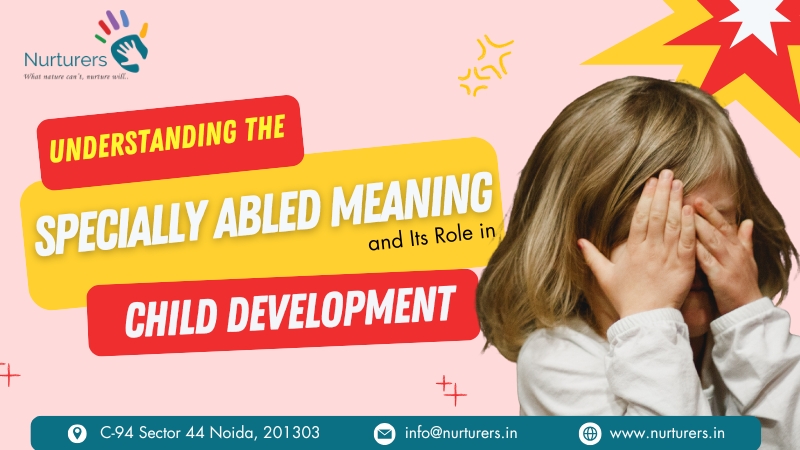Understanding the Specially Abled Meaning and Its Role in Child Development sheds light on the importance of shifting our perspective from focusing on disabilities to recognizing the unique strengths and abilities of every child. The term specially abled carries a more empowering and respectful connotation, encouraging society, educators, and families to view children through the lens of their potential rather than their limitations. This inclusive mindset not only builds a child’s self-esteem but also promotes acceptance, empathy, and equal opportunities in all areas of life.
Early identification of strengths, combined with personalized learning approaches and supportive environments, can significantly enhance a child’s cognitive, emotional, and social growth, especially for those with Childhood Developmental Disorders. Inclusive education, therapeutic interventions, and community awareness play a crucial role in enabling specially abled children to thrive.
Understanding the Specially Abled Meaning
The specially abled meaning goes beyond simply replacing the word “disabled.” It is a shift in mindset—a way of looking at individuals based on their capabilities, creativity, and determination rather than their limitations.
The meaning of specially abled includes:
- Recognizing that every person has a set of abilities unique to them
- Focusing on strengths rather than weaknesses
- Creating opportunities that allow individuals to participate fully in society
- Encouraging a culture of respect, empathy, and inclusion
A specially abled person may face challenges in one area of life but excel in another. For example:
- A child with dyslexia may struggle with reading but excel in visual arts or problem-solving.
- Someone with a hearing impairment might become an exceptional dancer because of heightened sensitivity to rhythm through vibrations.
This positive reframe doesn’t ignore challenges—it acknowledges them while making space for abilities to shine.
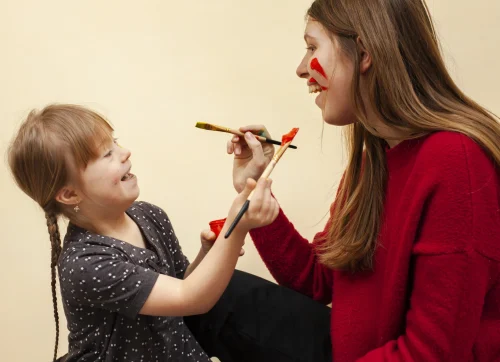
What is a Specially Abled Child?
When we talk about what is specially abled child, we refer to a child who has physical, cognitive, developmental, or sensory differences that require unique approaches to learning and development.
Some examples include:
- Physical challenges – Conditions such as cerebral palsy, muscular dystrophy, or limb differences may affect movement and coordination, but with physiotherapy, assistive devices, and adaptive sports, these children can lead active, fulfilling lives.
- Sensory impairments – Children with hearing loss, visual impairment, or sensory processing disorders may require alternative communication methods such as sign language, Braille, or sensory-friendly environments, enabling them to explore the world in their own unique way.
- Developmental conditions – Autism Spectrum Disorder (ASD), ADHD, and Down Syndrome may affect social interaction, attention span, and learning pace, but these children often possess extraordinary creativity, problem-solving skills, or memory abilities.
- Learning disabilities – Dyslexia, dyscalculia, and dysgraphia affect reading, mathematics, or writing skills. With targeted interventions like multi-sensory learning techniques and assistive technology, these challenges can be effectively managed.
A specially abled child might require adaptive learning tools, therapy sessions, or modified activities, but that does not mean they cannot achieve great things. In fact, with early intervention, they can often reach milestones faster than expected and develop skills that surprise everyone around them.
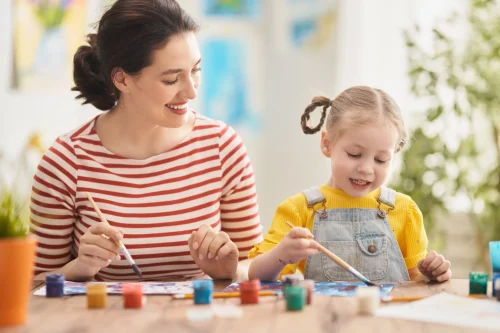
Why the Term Specially Abled Matters
Language influences thought, and thought influences action. Referring to someone as “disabled” focuses attention on what they cannot do. Calling them a specially abled person highlights their abilities, potential, and humanity.
The specially abled meaning is rooted in:
- Positivity – It replaces negative connotations with a hopeful and respectful tone, reducing stigma and promoting dignity. Instead of being defined by what is “lacking,” the term highlights what is present—creativity, resilience, and potential.
- Empowerment – The term inspires individuals to see themselves as capable contributors to society. A specially abled person is encouraged to dream bigger and push boundaries, because the language surrounding them supports ambition rather than limits it.
- Awareness – It reminds society that limitations are not life-defining. Many individuals with disabilities excel in fields like technology, art, sports, and leadership, proving that ability is not one-size-fits-all.
- Inclusivity – The term influences the creation of inclusive policies, educational programs, and workplace opportunities that welcome diversity instead of excluding it.
When a child grows up hearing empowering language, their self-image strengthens, which directly influences their willingness to try, learn, and succeed.
The Role of Specially Abled Children in Child Development
Child development isn’t just about academics—it’s about building life skills, emotional intelligence, and independence. Understanding allows parents and educators to tailor learning environments for the best outcomes.
Key Benefits of Individualized Support for Specially Abled Children:
- Enhanced Cognitive Growth – Customized lessons that match the child’s learning style—whether visual, auditory, or kinesthetic—help them absorb information more effectively. For example, a child with dyslexia may learn better through audio books and interactive activities rather than traditional reading exercises.
- Better Emotional Health – Consistent encouragement, recognition of achievements (big or small), and a supportive environment help a specially abled child develop self-confidence and emotional resilience. This emotional strength is vital for facing challenges both inside and outside the classroom.
- Stronger Social Skills – Inclusive classrooms and peer interaction opportunities teach cooperation, empathy, and effective communication. Specially designed group activities ensure that children of all abilities can participate and learn from one another.
- Physical Development – Therapies such as physiotherapy, occupational therapy, and adaptive sports improve mobility, balance, coordination, and fine motor skills, allowing children to become more independent in daily activities.
- Creative Expression – Many specially abled persons excel in creative fields when given the chance. Art, music, drama, dance, and other hands-on projects provide healthy outlets for self-expression while uncovering hidden talents.
At Nurturers, we believe that when we adapt teaching methods to a child’s needs, we help them become not only successful learners but also confident individuals.
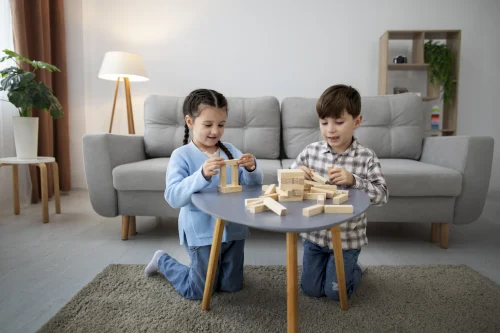
Supporting Specially Abled Children at Home
The home is the first school for every child. For a specially abled child, the right home environment can accelerate growth.
- Consistency – Follow a daily routine for meals, study, play, and sleep to create stability.
- Encouragement – Celebrate every achievement, big or small, to boost confidence.
- Skill Development – Engage in activities that build independence in daily tasks.
- Positive Communication – Use affirming words to reinforce the meaning of specially abled and self-worth.
- Family Involvement – Educate siblings and relatives to ensure collective support.
At Nurturers, we believe that with patience, love, and structured guidance, a specially abled person can thrive and achieve their full potential.
Supporting Specially Abled Children at School
Educational institutions play a vital role in shaping the future of a specially abled person.
- Inclusive Classrooms – Integrating children with different abilities helps everyone learn empathy and cooperation.
- Individualized Education Plans (IEPs) – Tailored academic goals ensure steady progress.
- Assistive Technology – From speech-to-text tools to tactile learning materials, technology bridges learning gaps.
- Teacher Training – Educators must understand the meaning of specially abled and be equipped with strategies for diverse learners.
- Peer Awareness Programs – Teaching classmates about inclusion creates a culture of respect.
Society’s Role in Empowering Specially Abled Persons
A specially abled person should have the same opportunities as everyone else—whether in education, employment, or community participation.
For society to truly embrace the specially abled meaning, we need:
- Wheelchair-accessible infrastructure
- Inclusive hiring policies
- Awareness campaigns to fight stereotypes
- Representation in media and leadership roles
- Community programs that welcome diversity
When these changes are implemented, barriers disappear, and specially abled individuals can participate fully in shaping society.
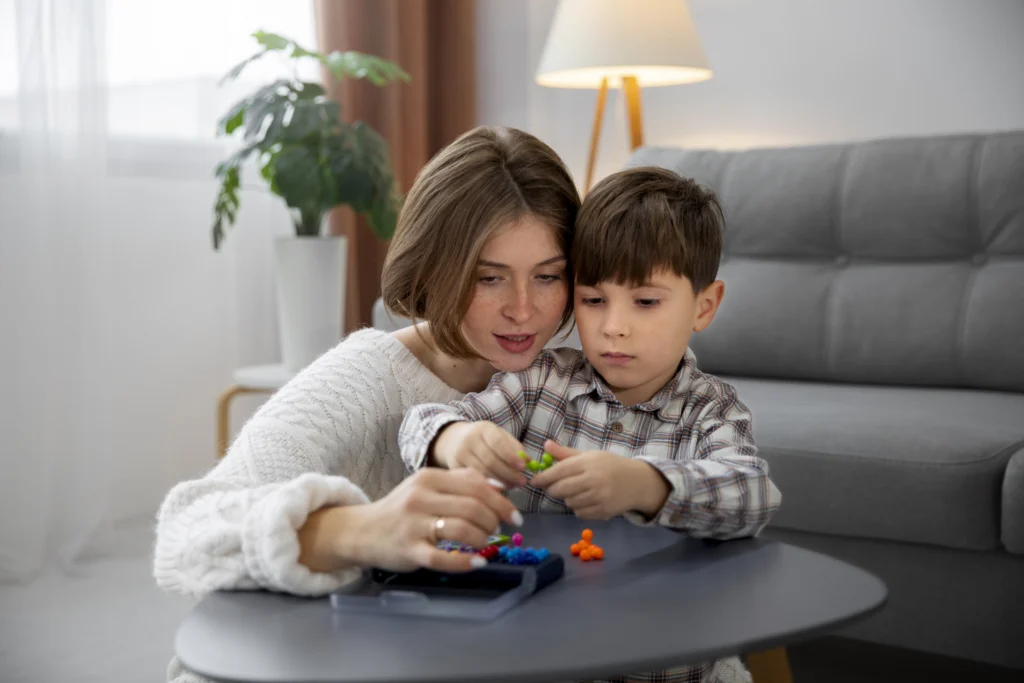
Real-Life Inspiration
Many specially abled individuals have achieved greatness when given the right support:
- Helen Keller – Overcame deafness and blindness to become a world-renowned author and activist.
- Stephen Hawking – Despite a debilitating illness, contributed groundbreaking work in theoretical physics.
- Sudha Chandran – A celebrated Indian classical dancer who continued performing with a prosthetic leg.
These examples remind us that the meaning of specially abled is more than a term—it is a testament to human resilience.
Conclusion
The specially abled meaning is about shifting from a mindset of sympathy to one of respect, recognition, and opportunity. Understanding what is specially abled child is helps parents, teachers, and society provide the right tools for growth. A specially abled person is not defined by limitations but by strengths, dreams, and determination.
At Nurturers, we believe every child deserves a future filled with hope, learning, and possibilities. When we nurture abilities, we nurture humanity.
